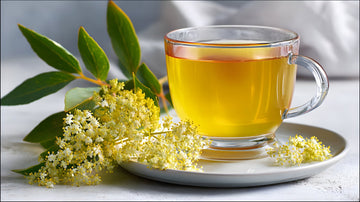Elderflower Tea with Thyme, Calendula & Peppermint: A Natural Remedy for Cold & Sinus Relief
Introduction
When cold and flu season strikes, many turn to nature for soothing remedies. Herbal teas have been trusted for centuries to ease congestion, calm inflammation, and support the immune system. One particularly powerful blend combines elderflower, thyme, calendula, and peppermint—four herbs known for their synergistic effects on respiratory and immune health.
Why This Blend Works
🌿 Elderflower: Immune Support & Sinus Comfort
Elderflower (Sambucus nigra) has long been used in European herbal medicine to reduce cold and flu symptoms. Modern studies support its antiviral and anti-inflammatory properties, and extracts from the elder plant have been shown to help reduce the duration and severity of cold symptoms .
🌿 Thyme: Clearing Airways & Reducing Inflammation
Thyme (Thymus vulgaris) contains thymol, a compound with antimicrobial and expectorant effects. It has been shown in lab studies to reduce airway inflammation, inhibit pathogens, and support mucus clearance, making it a natural choice for soothing coughs and blocked sinuses .
🌿 Calendula: Gentle Anti-Inflammatory Support
Calendula (Calendula officinalis) is widely recognized for its anti-inflammatory and antiviral effects. While it is often used topically for skin healing, research supports its broader immunomodulatory role, which may help calm irritation and inflammation in the body .
🌿 Peppermint: Cooling Relief & Mucus Clearance
Peppermint (Mentha × piperita) is a well-known herb for soothing sore throats and clearing congestion. It contains menthol, which acts as a natural decongestant and may help loosen mucus and ease breathing. Inhalation and ingestion of peppermint preparations have both shown benefits for respiratory relief .
How to Brew It (Step-by-Step)
-
Measure: Add 1 teaspoon of the tea blend per cup.
-
Steep: Pour hot (not boiling) water over the herbs and steep for 5–7 minutes.
-
Enhance: Add honey or lemon for extra soothing benefits.
-
Enjoy: Breathe in the aroma, sip slowly, and let the herbal synergy work.
Benefits at a Glance
| Benefit | Key Herbs Involved | How It Helps |
|---|---|---|
| Immune Support | Elderflower, Calendula | Enhances defenses against cold viruses |
| Sinus & Respiratory Relief | Thyme, Peppermint | Clears airways, reduces congestion |
| Antioxidant Protection | Elderflower, Calendula | Neutralizes free radicals, supports health |
| Soothing Flavor | Peppermint | Refreshing taste and cooling relief |
Who Should Try This Tea?
-
Anyone experiencing mild cold or sinus congestion
-
Those wanting a natural immune boost during flu season
-
Individuals looking for a caffeine-free, soothing herbal option
Suggested FAQs
Q: Does this tea really help with sinus pressure?
Yes—herbs like thyme and peppermint are traditionally used to open airways, reduce congestion, and improve breathing.
Q: Can I drink it daily?
For most people, yes. Up to 2 cups per day is safe for seasonal support. As always, consult your healthcare provider if pregnant, nursing, or on medications.
Q: Is there scientific support?
Yes—research backs the antiviral, anti-inflammatory, and expectorant properties of these herbs (see references below).
To order this wonderful blend go to https://herbalhermit.com/products/elderflower-tea-with-thyme-calendula-peppermint-for-cold-sinus-immunity
References
-
Vlachojannis, J. E., Cameron, M., & Chrubasik, S. (2010). A systematic review on the sambuci fructus effect and efficacy. Phytotherapy Research, 24(1), 1–8. PMC7347422
-
Tiralongo, E., et al. (2016). Elderberry supplementation reduces cold duration and symptoms. Nutrients, 8(4), 182. PMC4848651
-
Horváth, A., et al. (2016). Thyme extract reduces inflammation in human airway epithelial cells. Journal of Ethnopharmacology, 194, 67–75. PubMed 27369807
-
European Medicines Agency. (2017). Assessment report on Thymus vulgaris. EMA/HMPC/342334/2013.
-
Preethi, K. C., et al. (2009). Antiinflammatory activity of Calendula officinalis flowers. Indian Journal of Experimental Biology, 47, 113–120.
-
Eccles, R. (1994). Menthol and related cooling compounds. Journal of Pharmacy and Pharmacology, 46(8), 618–630.
-
McKay, D. L., & Blumberg, J. B. (2006). A review of the bioactivity and potential health benefits of peppermint tea. Phytotherapy Research, 20(8), 619–633.
